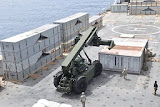US Defense Secretary Lloyd Austin held a series of meetings in Hawaii with his counterparts from the three countries last Thursday to set an "ambitious course" for peace, stability and deterrence in the Indo-Pacific. The four-way alliance has reportedly been nicknamed the "Squad" by Pentagon officials.
The four nations have held maritime military drills in April and are expected to hold more later this year.
Ashley Tellis, a senior fellow at the Carnegie Endowment for International Peace, said the Quad, a gathering of the US, Japan, India and Australia, has "an appearance of slippage" due to scheduling problems caused by the elections in India, an upcoming one in the U.S., and the wars in Europe and the Middle East.
But Tellis said these developments have put the role of the Quad in perspective.
"Where balancing China is concerned, the Quad is only one arrow among many in the US quiver," he said. "It has its greatest value in peacetime.
"In militarized crises and conflict with China, the minilaterals like AUKUS and the 'Squad', and most importantly, the US-Japan alliance will prove to be far more important than the Quad," he said.
"That is not to denigrate the Quad. It is simply underscoring a strategic fact of life," the former special assistant to President George W. Bush added.
Dhruva Jaishankar, executive director of the Observer Research Foundation America, said the newfound attention on the Squad grouping comes at a time when China has fired water cannons at Philippine supply ships in the South China Sea to prevent delivery of construction materials to the BRP Sierra Madre, a World War II-era ship grounded on the Second Thomas Shoal to bolster Manila's sovereignty.
"That's really where China's applying the greatest pressure at this time, even more than Taiwan, and it's really a test of the US alliance," Jaishankar said.
China's Foreign Ministry spokesperson has previously said the water cannon firings were a response to the ships intruding "without China's permission" and a "serious infringement" on Chinese sovereignty
New Delhi had hoped to convene a Quad summit earlier in the year, to coincide with a possible visit by US President Joe Biden visit to India in January, but the US leader was unable to make it citing a tight schedule.
India also explored a Quad summit before the Indian elections that began on April 19, according to Jaishankar. That too was thwarted by Biden's March 07 State of the Union address and Japanese Prime Minister Fumio Kishdia's state-level visit to the US on April 10.
"Clearly the triangle of the US, Japan and Australia is far more important," said Kent Calder, director of the Edwin O. Reischauer Center for East Asian Studies at the Johns Hopkins School of Advanced International Studies, adding that "a series of strategic triangles (including the U.S., Japan and South Korea, and the US, Japan and Philippines) are really the core of US foreign policy now."
The professor noted that all of these strategic triangles have clear functional purposes. The Biden administration is "too busy for more talk shops," he said. "The Quad under current circumstances does have that problem."
But Lisa Curtis, director of the Indo-Pacific Security Program at the Center for a New American Security, said the Squad is not a "replacement" for the Quad and should rather be seen as a supplement.
"India is an important part of the US Indo-Pacific strategy. It's a critical part," she said.
"In the event that there's any kind of conflict or crisis, either in the Taiwan Strait or the South China Sea, India will play a critical role in keeping an eye on the Indian Ocean region and the Malacca Strait," she said.
The difference between the Quad and the Squad is the presence of the word "deterrence." Despite its formal name of Quadrilateral Security Dialogue, the Quad has stayed away from security issues.
Joint statements issued after the past three Quad leaders summits have included references of "peace" and "stability" of the region but has never spoken about deterrence.
This is out of consideration for India, who has had a tradition of non-alignment, more recently known as strategic autonomy.



















